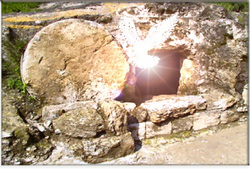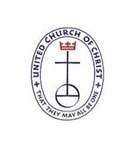|
What is a Catechism?
According to one source: cat·e·chism (kt-kzm)n. is 1. A book giving a brief summary of the basic principles of Christianity in question-and-answer form.2. A manual giving basic instruction in a subject, usually by rote or repetition. Catechisms can help us to teach our faith to our children and to each other. If used in a dedicated time of family study and worship it can be a very useful tool for faith formation. The United Church of Christ has many "testimonies of faith" one of which is the Heidelberg Catechism. The Heidelberg Catechism was published in the German university town of Heidelberg in 1563, a year before the death of the Reformer John Calvin who inspired its core testimony: that God does not abandon humanity to death but in sovereign freedom restores the broken relationship between God and God's children. The center of this drama is Jesus Christ. In the words of the 20th-century theologian Karl Barth (quoting a German hymn), the message of the Heidelberg Catechism is: "Get out of the way, you spirits of sadness, for Christ the sovereign of joy is coming in!" The Catechism was widely used in the Reformed Church in the United States—one of our antecedent denominations—and is still held in high regard by all churches of the Reformed tradition. The Heidelberg Catechism asks us this question regarding the resurrection How does Christ's resurrection benefit us? The answer given is: First, by his resurrection he has overcome death, so that he might make us share in the righteousness he won for us by his death. Second, by his power we too are already now resurrected to a new life. Third, Christ's resurrection is a guarantee of our glorious resurrection. For family reflection: What do you think the resurrection means for you as a Christian? What does it mean for the world at large? In what way
0 Comments
 Weekly Prayer Resurrecting God, you conquered death and opened the gates of life everlasting. In the power of the Holy Spirit, raise us with Christ that we, too, may proclaim healing and peace to the nations. Amen. Weekly Reading John 20:1-18 Early on the first day of the week, while it was still dark, Mary Magdalene came to the tomb and saw that the stone had been removed from the tomb. So she ran and went to Simon Peter and the other disciple, the one whom Jesus loved, and said to them, "They have taken the Lord out of the tomb, and we do not know where they have laid him." Then Peter and the other disciple set out and went towards the tomb. The two were running together, but the other disciple outran Peter and reached the tomb first. He bent down to look in and saw the linen wrappings lying there, but he did not go in. Then Simon Peter came, following him, and went into the tomb. He saw the linen wrappings lying there, and the cloth that had been on Jesus' head, not lying with the linen wrappings but rolled up in a place by itself. Then the other disciple, who reached the tomb first, also went in, and he saw and believed; for as yet they did not understand the scripture, that he must rise from the dead. Then the disciples returned to their homes. But Mary stood weeping outside the tomb. As she wept, she bent over to look into the tomb; and she saw two angels in white, sitting where the body of Jesus had been lying, one at the head and the other at the feet. They said to her, "Woman, why are you weeping?" She said to them, "They have taken away my Lord, and I do not know where they have laid him." When she had said this, she turned round and saw Jesus standing there, but she did not know that it was Jesus. Jesus said to her, "Woman, why are you weeping? For whom are you looking?" Supposing him to be the gardener, she said to him, "Sir, if you have carried him away, tell me where you have laid him, and I will take him away." Jesus said to her, "Mary!" She turned and said to him in Hebrew, "Rabbouni!" (which means Teacher). Jesus said to her, "Do not hold on to me, because I have not yet ascended to the Father. But go to my brothers and say to them, 'I am ascending to my Father and your Father, to my God and your God.'" Mary Magdalene went and announced to the disciples, "I have seen the Lord"; and she told them that he had said these things to her. All readings for the Week Acts 10:34-43 or Jeremiah 31:1-6 Psalm 118: 1-2, 14-24 Colossians 3:1-4 or Acts 10:34-43 John 20:1-18 or Matthew 28:1-10 Focus Questions 1. Why do you think Mary Magdalene, rather than, say, Peter, was chosen to be the witness to the resurrection? 2. What do you expect from life? What do you dare hope for? 3. When have you been caught off guard by "unbelievably" good news and unforeseen joy, something "too good to be true"? 4. Were you hesitant, or eager, to share what you experienced? 5. What evidence did you need in order to trust in the good news? What did you need to "see" in order to "go tell"? The great Easter egg hunt of 2011 was a good time for all involved. We had roughly 20 children participating this year and they all had the chance to hunt for and collect eggs for their Easter baskets.
The children also learned the importance of sharing when some of the older ones realizing that they had many more eggs than the younger children divided up what they had so that everyone would have just enough! Now that's worth all the eggs in the world. The cookie bake held at the church to raise funds for a cleft pallet surgery through the smile train program was a great success. 6 members of our Sunday school and their teachers baked up a storm on Saturday April 3rd and then sold the product of their labor on Sunday the 4th to eager & hungry members of the church. They raised over $190 of the $250 needed to make it possible for a child in the third world to received this life changing surgery!
Way to go kid's |
AuthorHighlighting the Christian Education programs of First Congregational United Church of Christ, Spencerport, NY Archives
February 2020
Categories |
